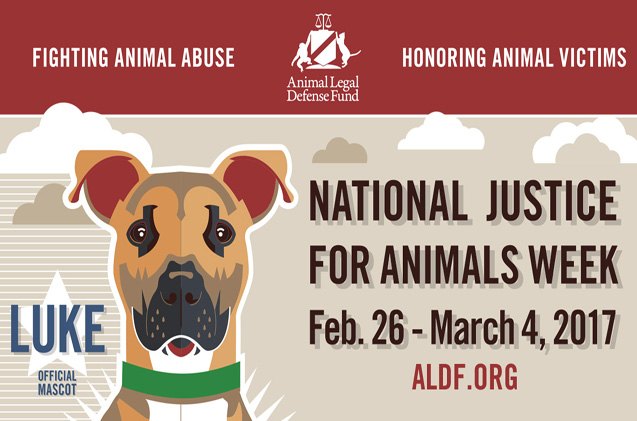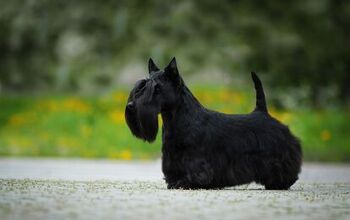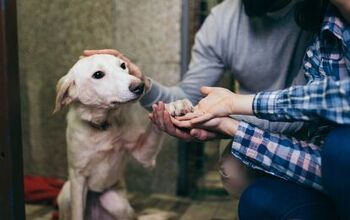Luke the Pitbull is 2017’s Mascot for National Justice for Animals W

Luke the Pitbull got a lucky break when it came to escaping a dangerous home. But no pet should to go through what he did in order to be safe and loved.
This week, February 26 to March 4, is National Justice for Animals Week. This is an observance of the Animal Legal Defense Fund (ALDF) in Cotati, California.
Each year, the ALDF nominates an inspiring pet to be the mascot for National Justice for Animals Week. This year, a Pitbull named Luke takes that honor. Having survived a shattered shoulder at the hands of his previous guardian — who was then acquitted of cruelty charges in court — a creative legal strategy allowed Luke to find a new forever home.
“Each year, the criminal justice system fails animal victims of abuse,” said Kelly Levenda, ALDF’s student programs attorney. “Luke is a great example of how we can make the laws work to protect animals.”
I spoke with Kelly more about ALDF’s work to help more animals escape abusive homes.
Q: To begin, please introduce us to ALDF.
The Animal Legal Defense Fund’s mission is to protect the lives and advance the interests of animals through the legal system. We file high-impact lawsuits to protect animals from harm, provide free legal assistance and training to prosecutors to assure that animal abusers are punished for their crimes, support laws that protect animals, fight against legislation that harms them, and provide resources and opportunities to law students and legal professionals to advance the emerging field of animal law.
Q: How did ALDF get started?
When Joyce Tischler, often called “the mother of animal law,” founded the Animal Legal Defense Fund in 1979, the field of animal law did not exist — there were no animal law courses, no animal law programs, and no animal law organizations.
Joyce changed that.
The Animal Legal Defense Fund has since blazed the trail for stronger enforcement of anti-cruelty laws and more humane treatment of animals in every corner of American life. Our groundbreaking efforts to push the U.S. legal system to end the suffering of abused animals are supported by thousands of dedicated attorneys and more than 200,000 members and supporters.
Q: What other projects, besides National Justice for Animals Week, does ALDF have?
The Animal Legal Defense Fund has four programs, each with their own projects.
The Legislative Affairs Program monitors legislation that impacts animals at the federal, state, and local levels, and then develops appropriate tactical responses — supporting legislation that would protect the lives and interests of animals, or opposing legislation that would harm animals’ interests and exploit them further.
The Criminal Justice Program is staffed by attorneys, including a former prosecutor, who provide free legal assistance to other prosecutors and law enforcement agencies to ensure that state criminal anti-cruelty statutes are vigorously enforced and that those convicted of animal cruelty and neglect receive appropriate sentences.
In certain cases, we offer rewards to citizens who share important information that leads to the arrest of an animal abuser. In 2016, the Animal Legal Defense Fund’s $5,000 reward offer in Sacramento, California, led to a crucial tipster coming forward and helping to convict a suspect in a malicious puppy killing case.
Since the beginning, cutting-edge lawsuits have been at the heart of our work to protect the lives of animals, and that is what our Litigation Program focuses on. From pushing government agencies to do their jobs to protect animals to shining a national spotlight on issues like factory farming and dissection in schools, our lawsuits — sometimes filed in coalition with other animal protection groups — aim to seek justice for those without a voice.
The Animal Law Program works closely with law students and law professionals to advance the emerging field of animal law. Moving toward the day when animal law is part of the curriculum at each and every law school, the Animal Law Program collaborates with students, faculty and school administrations to facilitate the development of animal law courses, and assists students in forming Student Animal Legal Defense Fund chapters.
Q: The Student Animal Legal Defense Fund chapters are a key part of ALDF’s work. What do these groups do?
Student Animal Legal Defense Fund, or SALDF, chapters are law student organizations that are affiliated with the Animal Legal Defense Fund and share its mission to protect the lives and advance the interests of animals through the legal system.
Today, there are more than 200 active SALDF chapters worldwide. SALDF chapters educate their members and law student body about issues animals face by volunteering at local sanctuaries, screening films, and hosting guest speakers.
Students are graduating knowing that animal protection is a serious social justice issue. These future attorneys, legislators, and judges will be influential advocates for changing the law to better protect animals.
Q: That’s really proactive. Through all of your programs, how many animals would you say ALDF impacts every year?
The Animal Legal Defense Fund helps the lives of countless animals every year.
Just last year, we rescued tigers, lions, wolves, and lemurs from cruel conditions at roadside zoos, and saved Kansas coyotes who would have been killed at a hunting contest that we stopped.
New generations of orcas will no longer have to perform at SeaWorld because of the Animal Legal Defense Fund’s victory in getting the theme park to agree to stop breeding its whales.
We have affected the lives of billions of farmed animals by giving them a voice. After we brought a challenge against Idaho’s Ag-Gag law, which aims to silence whistleblowers on farms and in slaughterhouses, the district court ruled it was unconstitutional.
Our successes go beyond individual animals, because they impact law and policy. We may never hear about all the animals impacted by our work.

Rita Brhel is a freelance writer with a huge heart for animals that she's passed on to her 3 children. Rita herself has a cat named Tippy (in photo) and 4 finches. Her 3 kids and husband share an additional 3 cats, 3 small parrots, 3 rabbits, 5 pigeons, 8 chickens, and 2 ducks on their acreage near Hastings, Nebraska, USA. She has experience with a lot of different species of pets of her own, has worked a 1-year stint in a vet clinic as part of a hands-on journalism project, and has been a foster pet parent for an animal shelter. Each of her children dream of careers working with animals, and Rita wholeheartedly supports them!
More by Rita Brhel
























